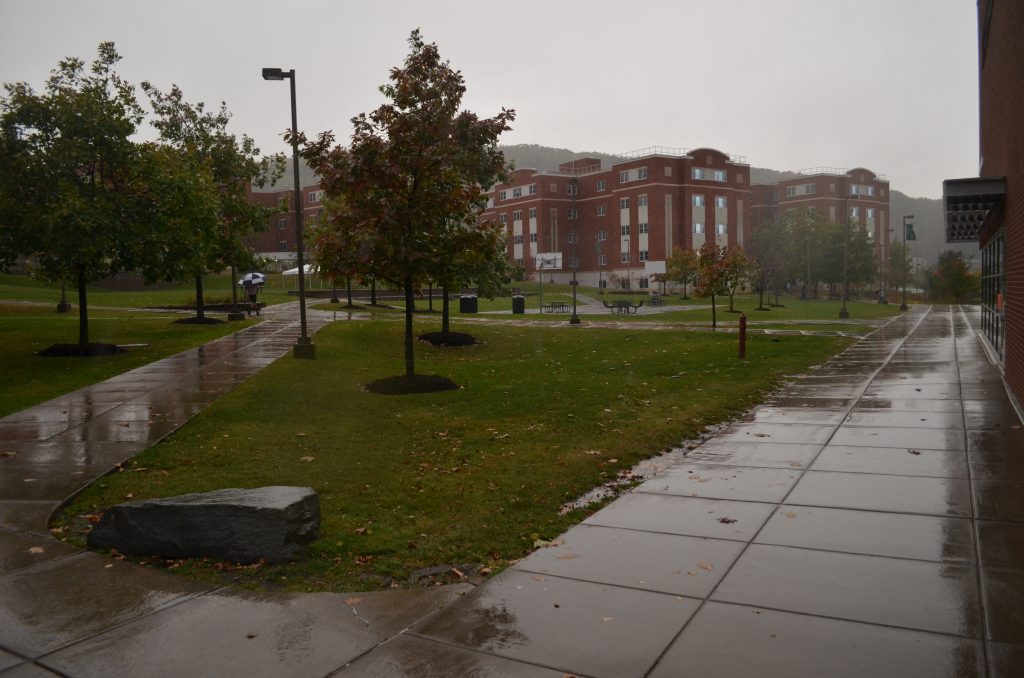This semester, resident assistants (RAs) have taken on the new role of coronavirus policy enforcement officers. To alleviate the demands on RAs, Binghamton University created a COVID-19 Compliance Response Team.
Prior to a Student Association (SA) meeting on Sept. 29, SA members sent questions for BU President Harvey Stenger and other administrators to answer during the meeting. One addressed the new expectation of RAs to enforce COVID-19 policy in addition to their other duties and schoolwork which, according to some, has made the job stressful.
Asher Simonson, a sophomore majoring in English, expressed his sympathy for his RA, who he has had since freshman year.
“The RAs are trying to adapt,” Simonson said. “They definitely are, but they’re not really supposed to find reasons to see you, so they struggle to do that. You don’t want to hang out with your residents because then you might have to write them up. They don’t want to be the police.”
Randall Edouard, dean of students and assistant vice president for student affairs at BU, unveiled the new COVID-19 Compliance Response Team. The team consists of 17 graduate students who will patrol campus to ensure students follow the University’s COVID-19 guidelines. They will be active Sundays to Thursdays from 11 a.m. to 10 p.m. and Fridays to Saturdays from 11 a.m. to 1 a.m.
Edouard stressed that BU administrators treated the RAs’ grievances as a top priority.
“We always want to make sure that we are taking care of our students,” Edouard said. “The [University] president thought about this issue with regards to RAs. The provost thought about this, the vice president of student affairs and the director of [Residential Life]. This went all the way to the top. We wanted to make sure that we were supporting our RAs.”
Paola Mignone, director of Residential Life, also spoke at the SA meeting where she emphasized other ways in which the University has tried to reduce the burden of COVID-19 enforcement on RAs.
“We made it clear to the RAs that we don’t expect them to be [COVID-19] enforcers 24/7,” Mignone said. “When an RA is off duty, we have the same expectations for them as we do for any other student, especially around [COVID-19]. A lot of us at [Residential Life] have been making sure to pay attention to the RAs and their workload.”
Adam Silhavy, a sophomore majoring in biochemistry, said the enforcement role RAs have assumed has placed more stress in their lives.
“For an RA, the pressure is just magnified tenfold,” Silhavy said. “[COVID-19] has really forced them to be an antagonist. It’s putting a lot more pressure on these people. They don’t want to be forced to actually end somebody’s semester.”
According to Michael DiMaio, a sophomore majoring in systems science and industrial engineering, RAs have become isolated from their residents as a result of their new role. Other than being locked out of his room one time, DiMaio said that he has had no interaction with his RA.
“I think the RAs don’t really want to be around people because people can say ‘Oh, the RA came around and now I have [COVID-19],’” DiMaio said. “Last year we would have kitchen nights, but because of what’s going on, we obviously can’t do that this year.”
Students also expressed skepticism about whether the new COVID-19 Compliance Response Team will relieve the demands on RAs.
“If they’re not going inside the building, it doesn’t seem like they’re doing anything to help the RAs,” Simonson said.
Silhavy expressed worry that students who already break the guidelines by congregating without masks outside will go indoors as a result of the team’s presence.
“If anything [the response team] might make it worse,” Silhavy said. “So, you grab your food and you don’t sit outside anymore because you’re going to be harassed by this new task force. So you go into your buildings and that puts the pressure on the RA.”
Despite skepticism regarding the COVID-19 enforcement team, there are still hopes among some that the team will help ease the extra responsibilities RAs are carrying.
“We love our RAs,” Silhavy said. “We only wish that things were more normal so that we could actually interact with them.”
Kimberly Gonzalez contributed reporting to this article.



